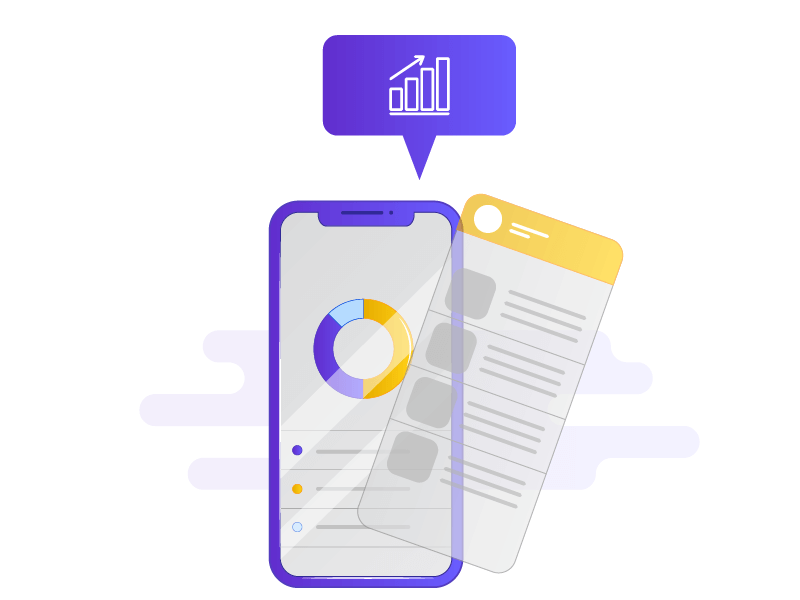The world has gone mobile, and the habits of consumers have never been the same since then. People use their mobile devices to communicate, interact with their favorite brands and people, manage their daily tasks, shop, play, etc.
But you already know that, and that’s one of the reasons why your business needs an app. You know where your customers are, and you want your company to be there, too—right in front of their eyes on their phone or tablet screens. That’s why you are here, looking for answers to making an app for your business.
We build mobile apps and websites for businesses like yours. Talk to our experts about your business needs.
Creating an app for your business is a step-by-step process. Here’s what you’ll need to do:
- Create a business strategy.
- Conduct audience research.
- Hire app developers.
- Plan implementation and budget.
- Market your new app.
- Collect feedback and improve.
#1. Create a business strategy
Mobile app strategy summarizes all the key considerations related to your app, not only the app development process. It also covers how your app will seamlessly integrate with your business, communicate with your app users (customers), and generate ROI.
There are several aspects of the business app strategy you shouldn’t neglect:
1. Customer experience. The mobile app strategy starts with finding out how you want your users to interact with your app. Your business app should provide customers with precisely what they want and be compelling enough to keep them revisiting your app.
2. App development method and platform. You can either build the app in-house or outsource an app development team when it comes to the app development process. Whichever approach you choose, you’ll also have to decide whether you want to develop two independent native apps to cover users with devices running on Android or iOS or one cross-platform app covering both bases.
3. Monetization system. The app monetization system is one of the critical elements of a mobile app strategy that should be designed in such a way to help you increase your business revenue. Your app strategy should support your business by engaging your users and encouraging them to spend money on your app.
4. Business goals. The purpose of the mobile app is two-fold. On the one hand, you want your app to serve as a digital asset that will boost your business efforts. So you need to plan how your app will fulfill this role. On the other, any business app should also focus on users and cater to their needs. What problems will your app help solve to make your potential users want to install and use it?
5. Market, users, and competition research. Thorough research will help you choose the suitable app marketing approaches. It will also let you answer business questions: What is your target audience? Why would they be interested in your app? How does your competition approach its customers?
#2. Conduct user research
At the initial stage of ideating a business app, there must be a product vision based on user research. At this point, user research should reveal who the users are, how they interact with mobile apps, what platforms they use, what features they expect, and the level of their technical expertise.
Your User Experience (UX) Designers or UX Researchers might find that your app target audience is far more diverse than you have initially anticipated. And therefore, it will be made of more than one persona. In such a case, UX professionals will need to strive to design a relevant app that will accommodate the needs of both user segments.
Furthermore, keep in mind that the market keeps changing with new users’ demands. Therefore, technical innovation will play an essential role in keeping your business application in use.
#3. Hire app developers
When you have defined your business strategy and users, it’s time to start thinking about who will build an app for your business. You can opt for in-house development or hire a dedicated development team, as hinted earlier.
In either case, app development alone isn’t just about web or software developers. You will also need specialists who will handle design and experience, software testing, and manage the process of building your business app at every stage.
If you don’t have a development team on board yet, it might be a good moment to consider hiring a full team of professionals.
First, it will significantly speed up the development process since you won’t have to hire developers and other team members individually. And second, by choosing an experienced development team that has delivered hundreds of apps, you can rest assured that they will thoroughly analyze your business needs and suggest the best solutions and approaches.
Over 200 successfully developed custom apps and websites. Will your business app be next?
#4. Plan project implementation & budget
Mobile app development process involves designing, developing, testing, launching, and maintaining mobile applications. In other words, you will put your business app idea on paper or a whiteboard. You want to create several mockups to test as many use cases as possible, including the look, workflow, the number of screens, etc. This step applies to both Android and iOS platforms.
Having these rough specifications will help you when your application goes into the design and development phase. Remember—the more scenarios you manage to cover and identify the best design for your users, the fewer re-works your team will have to do. In the long term perspective, it means lower app development costs and faster release.
The next step will involve creating a rapid prototype, i.e., a prototype conveying your app concept that gets into a user’s hands as quickly as possible. The idea is to see how your app works for the most common use case. Focus on the concept, not detailed wireframing.
Once you have gathered feedback from your stakeholders, it’s time to design for the user experience. Your mobile developers can begin to work on your app only when the design is ready. Your development team will most likely work using an agile methodology since it supports collaboration, transparency, and quick iteration cycles that help the team adapt to changes.
And finally, once your app is designed, coded, and tested, you can release it to your audience.
Developing a mobile app is far more expensive than you might think. Many factors influence the final price and the app development time. For instance, the complexity and type of the app, the number of required features, development platform, in-house or outsourcing development model.
To estimate roughly the costs of building an app, run detailed research on your app needs (e.g., features, mobile platform, native vs. cross-platform, design, server vs. cloud). Then, contact a few software companies (including those from the top countries for IT outsourcing to get a rough idea of how much you could save) and ask for a quote.
Remember—a successful app is a sign of good quality. So when you reach out to app development companies, consider those that offer comparable services, have a proven track record of creating successful apps and have high-customer ratings.
Get more insights: How Much Does It Cost to Build an App Like Uber?
#5. Market your new app
App marketing efforts cover user interactions at every stage of using the app. Those interactions start from the moment they first learn about your app and lead to the point when they become loyal users. The goal is to acquire users who will not only drive repeat engagement but will also become loyal advocates for your app.
Here are a few ideas for marketing your newly-developed app.
1. Marketing channels. To sell your business app effectively, you’ll need to find the best channel to reach and communicate with your target audience (which you have defined already in the earlier steps) and analyze their in-app behavior. Those could be social media platforms or email. The behavior analysis will help you develop ideas for continuous improvements for your app.
2. Landing page and SEO. Set up a dedicated landing page that will allow users to learn more about your app. A landing page is also an excellent way to boost your SEO (Search Engine Optimization) and attract new users through organic traffic. At this point, focus on a clear visualization of what users can expect if they install your app, along with a short but comprehensive (and SEO-friendly) copy. Your landing page should include links to download your app with a clear call to action.
3. ASO. If you plan to release your business application through the Google Play Store or AppStore, you can help your potential users to find it with ASO (AppStore Optimization). Similar to SEO, good app store optimization depends on many factors, such as title, description, and choice of relevant keywords. You can improve the quality of your app listing by adding screenshots, videos, features, and benefits the app provides. And finally, if you want your business app to be found by users who speak other languages, localize the listing copy for the target language.
#6. Collect feedback and improve
Your app is live. You’re observing mobile users installing it on their devices and leaving feedback. Good work! But you’re not done yet. Mobile app development is an ongoing process. No matter how great your app turns out, there’s always some room for improvement and innovation. Trends in UI and UX change, and the same goes for your users’ expectations. That’s why you must consider their feedback, market demands, new competitors, and advancements in technology to keep your business app afloat.
Furthermore, keep in mind that Android and iOS systems are being continually developed and updated. The same goes for the latest devices. Your app must be maintained to remain compatible, secure, and usable for those reasons.
In addition to maintenance updates, you may want to consider adding new features based on user feedback and in-app user behavior. Such an approach will keep your users excited and show them that you care about what they have to say. Over time, continuous improvement will attract new users and retain the existing ones.
Summary
Many different factors and phases go into creating a business app. Luckily, building an app for your business can be easy, fast, and cost-effective with the right strategy and team.
At IDAP, we’ve been building web and mobile apps since 2012. We leverage our experience and expertise to guide our clients at every stage of the app development process. Feel free to contact us to learn more about what we do, how we work or discuss what our experts can do for your business.



